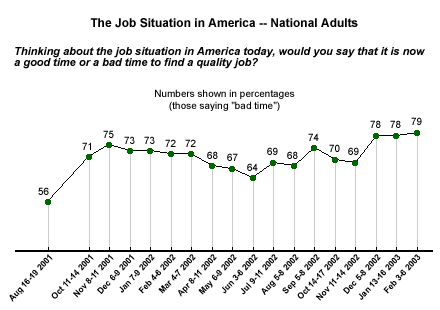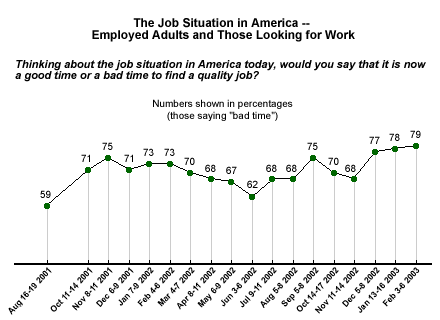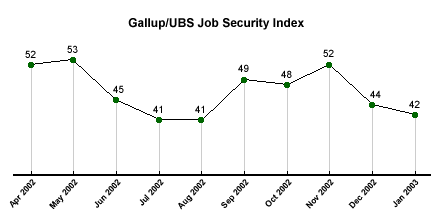On Feb. 7, the U.S. Department of Labor announced that the nation's unemployment rate declined from 6.0% in December to 5.7% in January. According to the report, retail businesses (many of which did not hire as many employees as usual over the holidays because of slower-than-normal sales) did a complete turnaround in January, adding 101,000 new positions during a traditionally slow sales period. Does this mean that the jobs recession of the past couple of years is over? Is now a good time to look for a quality job?
Most Americans Do Not Think So …
According to the latest Gallup Poll (Feb. 3-6)*, nearly four in five Americans (79%) believe that now is a bad time to find a quality job. This is the highest percentage saying it is a bad time to find a job since Gallup began asking this question in August 2001. More importantly, it shows no improvement from the 78% of Americans who responded this way in December and January.

… Nor Do Those Employed or Looking for Work
People who are employed or looking for work may know more about conditions in the job market than other Americans, but this group holds the same view as the public at large. Seventy-nine percent of those employed or looking for work also tell Gallup that now is a bad time to find job. This is the highest percentage to date.

Job Security Index Declines
According to the January Job Security Index -- part of the Gallup/UBS Employee Outlook Index** -- employees at private sector, for-profit companies also do not see the labor market improving. The Job Security Index declined slightly last month, from 44 in December to 42 in January. The Index is now essentially at the same low level that it experienced in July and August 2002. (See "Do Employees Have Reason to Be Less Optimistic?" in Related Items.)

Misleading Data
The new unemployment numbers are hard to believe for several reasons. Simple logic suggests that the nation's retailers did not go on a hiring spree following a weak holiday season. The usual seasonal adjustments are subject to question this year because businesses did not hire as many temporary workers as they normally do late in the year because of lackluster holiday sales. And , the Labor Department made some significant changes to the question wordings in its survey, which can lead to faulty data comparisons.
Given these deficiencies, I place much more confidence in public perceptions concerning conditions in the job market than I do in the latest government report. If you're out looking for a job and having a tough time, you're not alone. And if you're working for a business that has decided to delay hiring, you also have lots of company.
The prospects for a near-term improvement in the labor market are not good. According to the Feb. 3-6 poll, 60% of the public says that current economic conditions are getting worse, compared to only 27% who say they are getting better -- a view that is supported by economic fundamentals. It is going to take a real improvement in the economy, not a change in government reporting, to create real improvement in the nation's job market.
*Results are based on telephone interviews with 1,001 national adults, aged 18 and older, conducted Feb. 3-6, 2003. For results based on the total sample of national adults, one can say with 95% confidence that the maximum margin of sampling error is ±3%. For results based on the sample of 637 adults employed full or part time or unemployed adults looking for work, the maximum margin of sampling error is ±4%.
**Results for the Job Security Index are based on telephone interviews with 641 adults who are employed with non-governmental, for-profit companies having five or more employees, aged 18 and older, conducted Jan. 13-16, 2003, and Jan. 20-22, 2003. For results based on the total sample, one can say with 95% confidence that the maximum margin of sampling error is ±4%.

